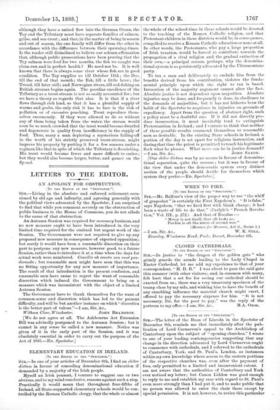ELEMENTARY EDUCATION IN IRELAND.
[To THE EDITOR OF THE " SPECTATOR."]
Sin,—In one of your articles of December 8th, I find an obiter 'dictum in favour of conceding denominational education if demanded by a majority of the Irish people.
Myself an Irish peasant,- I venture to suggest one or two obvious, and to my mind conclusive, reasons against such a step. Practically it would mean that throughout four-fifths of Ireland, all State-supported elementary schools would be con- trolled by the Roman Catholic clergy, that the whole or almost the whole of the school-time in these schools would be devoted to the teaching of the Roman Calholic religion, and that Protestant children in these districts would be, in consequence, compelled to receive a Roman Catholic education or none at all. In other words, the Protestants, who pay a large proportion of Irish taxation, would be forced to contribute towards the propagation of a rival religion and the gradual extinction of their own,—a principal reason, perhaps, why the denomina- tional system is so persistently advocated by the Ultramontane party. To tax a man and deliberately to exclude him from the benefits derived from his contribution, violates the funda- mental principle upon which the right to tax is based. Invocation of the majority argument cannot alter the fact. Absolute justice is not dependent upon majorities. Absolute injustice may be done, and frequently is done, in obedience to the demands of majorities ; but it has not hitherto been the habit of the Spectator to acquiesce in injustice on grounds of expediency. Apart from the question of abstract right, such a policy must be a doubtful one. If it did not directly pro- duce insurrection, it must inevitably tend to extinguish Protestantism in Ireland ; and I venture to think that neither of these possible results commend themselves to reasonable men as desirable. In the existing State schools in Ireland, a portion of the day is set apart for religious instruction, and during that time the priest is permitted to teach his legitimate flock what he pleases. What more can he in justice demand?
[Our obiter dictum was by no means in favour of denomina- tional separation, quite the reverse ; but it was in favour of the view that under the democratic system every distinct section of the people should decide for themselves which system they prefer.—En. Spectator.]














































 Previous page
Previous page